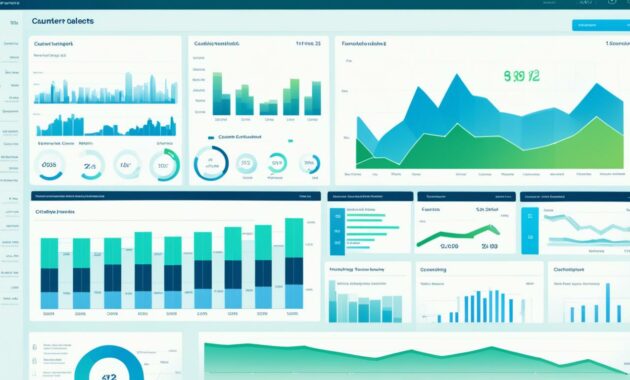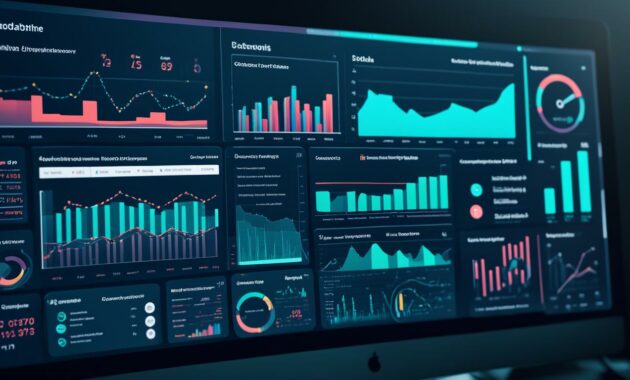Welcome to our comprehensive guide on leveraging the power of Business Intelligence Tools to drive your company’s growth and success. In today’s data-driven world, harnessing the potential of your data is key to staying ahead of the competition and making informed decisions. That’s where Business Intelligence Tools come in.
Imagine having the ability to transform raw data into actionable insights that propel your organization forward. With the right Business Intelligence Tools, you can achieve just that. These tools enable you to analyze complex datasets, identify trends, and uncover hidden patterns that might otherwise go unnoticed.
Understanding the Importance of Business Intelligence Tools
In today’s fast-paced business landscape, staying ahead of the competition is crucial. That’s where Business Intelligence Tools come into play. By harnessing the power of data, these tools enable modern organizations to make informed decisions, optimize operations, and gain a competitive edge.

Improved Operational Efficiency
Business Intelligence Tools streamline and automate data collection, analysis, and reporting processes. By eliminating manual tasks and providing real-time insights, these tools help organizations optimize their operations, reduce costs, and make data-driven decisions swiftly.
Enhanced Decision-Making
With Business Intelligence Tools, organizations can transform raw data into actionable insights. By visualizing data in intuitive dashboards and reports, these tools enable stakeholders to easily identify trends, patterns, and key performance indicators. This empowers decision-makers to make informed choices that drive growth and success.
Gaining a Competitive Edge
In today’s data-driven world, organizations that can leverage their data effectively have a significant advantage over their competitors. Business Intelligence Tools empower companies to gain valuable insights into customer behavior, market trends, and emerging opportunities. By leveraging these insights, organizations can proactively adapt their strategies to seize new business prospects and outperform the competition.
Investing in Business Intelligence Tools is no longer a luxury. It has become a necessity for organizations seeking sustainable growth and success. By leveraging the power of data and embracing these tools, companies can unlock their full potential and navigate the complex business landscape with confidence.
Choosing the Right Business Intelligence Tools for Your Needs
When it comes to selecting the best business intelligence tools for your organization, it’s essential to consider your specific requirements. By choosing the right tools, you can harness the power of data and gain valuable insights that drive informed decision-making. Here, we’ll guide you through the factors to consider:
1. Scalability
One crucial aspect to consider is the scalability of the business intelligence tools. As your organization grows, so will your data needs. Ensure that the tools you choose can handle large volumes of data and accommodate future growth. This will prevent the need for frequent tool replacements or upgrades.
2. Ease of Use
The business intelligence tools you choose should be user-friendly and intuitive. Look for tools with a streamlined interface and easy-to-learn functionalities. This will enable your users to quickly adopt the tools and start extracting insights without the need for extensive training.
3. Integration Capabilities
Consider the integration capabilities of the business intelligence tools. Look for tools that can seamlessly integrate with your existing data sources, databases, and systems. This will allow you to consolidate all your data in one place, making it easier to analyze and derive meaningful insights.
4. Unique Data Needs
Every organization has unique data needs. Consider the types of data you work with, such as structured, unstructured, or real-time data. Make sure that the business intelligence tools you choose can effectively handle and analyze your specific data types. This will ensure that you can extract the most relevant insights for your organization.
Incorporating these considerations will help you choose the most suitable business intelligence tools for your organization. By selecting tools that offer scalability, ease of use, integration capabilities, and align with your unique data needs, you can unlock the full potential of your data and drive your organization towards success.
Exploring Advanced Features of Business Intelligence Tools
Business intelligence tools offer a wealth of advanced features and functionalities that can revolutionize the way you analyze and interpret your data. These tools go beyond basic reporting and provide you with powerful capabilities to extract valuable insights from your business information. Let’s explore some of the key advanced features offered by top business intelligence tools:
Data Visualization
One of the standout features of business intelligence tools is their ability to visualize data in a meaningful and interactive way. With intuitive charts, graphs, and dashboards, you can transform complex datasets into easily understandable visuals. This allows you to identify trends, spot patterns, and communicate insights effectively to stakeholders across your organization.
Predictive Analytics
Business intelligence tools leverage predictive analytics algorithms to forecast future outcomes based on historical data and trends. By analyzing patterns and identifying correlations, these tools can help you make informed predictions and anticipate potential business scenarios. This enables you to proactively manage risks, optimize operations, and make strategic decisions with confidence.
Real-Time Reporting
In a fast-paced business environment, real-time reporting is crucial for staying agile and responsive to market changes. Leading business intelligence tools provide real-time data updates, allowing you to monitor key metrics and performance indicators as they happen. This empowers you to make timely decisions and adapt your strategies to seize opportunities and address challenges promptly.
Furthermore, with real-time reporting, you can quickly identify anomalies, outliers, and deviations from expected trends, enabling you to take immediate corrective actions and prevent potential issues from escalating.

By leveraging these advanced features, business intelligence tools empower you to unlock the full potential of your data. They enable you to gain deeper insights, make data-driven decisions, and stay ahead of the competition in today’s dynamic business landscape.
Implementing Business Intelligence Tools for Optimal Results
Now that you understand the importance of business intelligence tools and have gained insights into selecting the right tools for your organization, it’s time to focus on implementing these tools effectively. In this section, we will guide you through the process of implementing business intelligence tools to ensure you achieve optimal results.
1. Define your objectives: Before diving into the implementation process, it’s crucial to clearly define your objectives. What specific goals do you want to achieve with your business intelligence tools? Whether it’s improving decision-making, enhancing operational efficiency, or gaining a competitive edge, having well-defined objectives will help you stay focused throughout the implementation process.
2. Assess your current infrastructure: Evaluate your existing infrastructure to determine if it can support the implementation of business intelligence tools. Consider factors such as hardware, software, and data storage capabilities. If necessary, you may need to upgrade or invest in additional resources to ensure smooth implementation and optimal performance.
3. Plan for data integration: One of the key challenges in implementing business intelligence tools is integrating data from various sources. Create a comprehensive plan to ensure a seamless flow of data from different systems, databases, and applications. This will enable you to consolidate and analyze data effectively, providing valuable insights for decision-making.
4. Choose a phased approach: Implementing business intelligence tools can be a complex process. Instead of trying to tackle everything at once, consider adopting a phased approach. Start with a pilot project or focus on specific departments to ensure a smooth transition. This will allow you to identify and address any challenges or issues early on before scaling up the implementation.
5. Provide comprehensive training: To maximize the impact of your business intelligence tools, provide comprehensive training to your employees. Ensure that they understand not only how to use the tools but also how to interpret and analyze the insights provided. Training will empower your team to make data-driven decisions and leverage the full potential of these tools.
6. Foster user adoption: Successful implementation of business intelligence tools relies on user adoption. Encourage and motivate your employees to embrace these tools as part of their daily workflow. Highlight the benefits and value they bring, and provide ongoing support to address any concerns or challenges they may encounter.
7. Monitor and evaluate: Lastly, continuously monitor and evaluate the impact and performance of your business intelligence tools. Regularly analyze the results and feedback to identify areas for improvement and further optimization. By keeping a pulse on the effectiveness and usage of these tools, you can ensure they continue to deliver the desired outcomes for your organization.
By following these best practices and addressing potential challenges, you can implement business intelligence tools successfully and harness their full potential for driving growth and success in your organization.
Conclusion
In conclusion, integrating top Business Intelligence Tools into your company’s operations can open up a world of growth opportunities. By harnessing the power of data and transforming it into meaningful and actionable insights, you can steer your organization towards success. These tools enable you to make informed decisions based on accurate and up-to-date information, giving you a competitive edge in today’s dynamic business landscape.
Investing in reliable and scalable Business Intelligence Tools is a strategic move that can bring about transformative results. With the ability to analyze vast amounts of data efficiently, you can uncover hidden patterns, identify trends, and gain deeper visibility into your business operations. Armed with these insights, you can optimize processes, identify new revenue streams, and streamline decision-making across your organization.
By embracing Business Intelligence Tools, you empower your teams with the knowledge they need to fuel growth. From the C-suite to the front lines, everyone can access relevant data and make evidence-based decisions. This democratization of data fosters a culture of collaboration and empowers your employees to contribute to the organization’s overall success. With the right Business Intelligence Tools in place, you can unlock the full potential of your data and pave the way for a future of sustainable growth.
